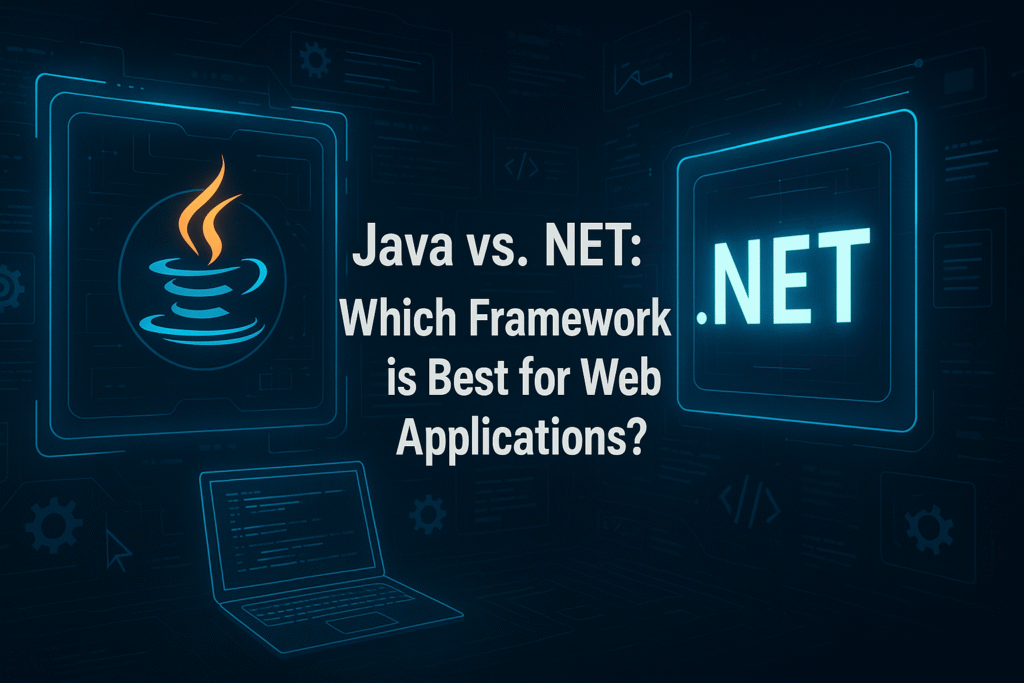2 powerful frameworks. One is backed by Microsoft and trusted by Fortune 500 companies. The other is known for its reliability and is currently supporting 3 billion phones worldwide!
This is the battle between Java and .NET. They’re both used for building websites and mobile apps. Choosing between the two is confusing! Whether you invest in backend development services or partner with a seasoned company, the goal remains the same: To build a secure and scalable digital solution.
If you’re curious to know which programming language is best suited for your business, this guide is for you.
Java Vs .NET: Quick Comparison
These tools are both popular to build enterprise grade platforms. Nevertheless, they are different in terms of architecture and flexibility. An expedient comparison of them is as follows:
| Aspect | .NET | Java |
| Ownership | Microsoft | Oracle |
| Cloud Compatibility | Integrates with Azure | Works well with major cloud providers. |
| Use Cases |
|
|
| Performance | High performance thanks to modern .NET runtime. | Ideal for high-load systems |
| Speed | Faster, it doesn’t require push updates. | Slower in speed, but offers reusable components |
| Community Support | Smaller as compared to Java. | Larger developer support |
| Tools Used | Visual Studio and Rider | Eclipse, IntelliJ IDEA |
The Market Outlook
The market demand for both Java and .NET is growing exponentially. Java remains a preferred choice for backend and enterprise solutions. It’s versatile platform across domains and is often used for cloud computing and big data.
Windows .NET is much appreciated, particularly when it comes to web, desktop and mobile programs. .NET specialists that are in demand include developers in banking and healthcare.
If you are intending to invest in the services of backend development, you can be assured that .NET will ensure the safety of your applications and their suitability in the future.
Java: The Backbone of Enterprise and Cloud
Tech giants like Amazon, Netflix, Spotify, and Google all rely on Java. One major advantage of using this language is that it supports artificial intelligence and machine learning (ML). It’s ability to support IoT devices is also another reason why its popular amongst renowned companies.
4 Reasons Why Businesses Opt for Java:
- Cross-platform reliability: Java can be used on multiple devices such as windows, Linux and MacOS.
- Enterprise trust: Java is used by banks, telecoms, and logistics industries.
- Future-Proof Updates: The long-term support (Java 8 until 2030, Java 11 until 2026) will guarantee secure performance.
- Compatibility with AI and cloud APIs: Java remains competitive due to its flexibility.
Businesses that seek Java development services ensure they get affordable and scalable solutions.
Limitations of Java
Although there are multiple benefits of using Java, it has limitations of its own.
- Performance Issue: Slower than other programming languages like C++ due to its abstraction layer.
- Code Overload: Java needs more lines of code to do the same thing compared to modern languages like Python or Kotlin.
- Memory Issues: The automatic memory cleanup (garbage collection) can cause performance hiccups.
- License Fees: Oracle charges money for commercial use, which can be expensive for businesses.
Dot Net: The Powerhouse for Microsoft Ecosystem
If you’re planning to build a cross-platform application for cloud and enterprise, .NET is the solution. Dot Net also supports IoT devices and is often used for projects that require Azure and Windows cloud infrastructure.
Why Businesses Love Dot Net:
- Cross-Platform Compatibility: Supports Linux, macOS, and containerized environments.
- Cloud Native: Works well with Azure and DevOps workflows.
- Diverse Use Cases: Popular amongst industries like gaming, banking, healthcare, and educational platforms.
- Security: Features like built-in authentication help government businesses build their applications.
When you partner with a dotnet development company, enterprises can quickly deploy secure, integrated systems across departments.
Challenges of Dot Net:
.NET is a widely favoured technology and is widely used in enterprise web, desktop as well as mobile applications. There are several problems that may arise before making this language a choice:
- Stuck on Windows: Older .NET applications will only be executed on Windows and its harder to migrate to other operating systems.
- Limited Tools: Although the.NET platform has numerous tools, Java has a greater repository of open-source libraries.
- Difficult to master: Advanced features Out of the box: Advanced features in .NET are more technical to master.
Final Verdict: Which Programming Language Wins?
The answer is both. There is no clear winner. It depends on the requirements your project has and the KPIs you want to prioritize.
If you need higher flexibility, open-source agility and cross-platform reach, then select Java. Dot Net is a good choice if you need faster prototyping and enterprise-deep integration.
When you partner with an expert backend development service provider, ensure cost-effective solutions and maintenance planning.
Ultimately, both these programming languages help you build your digital solution. But your success lies in selecting the right service provider.



